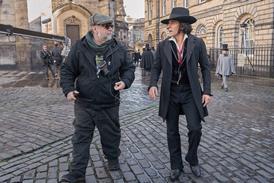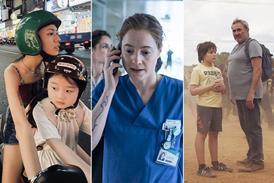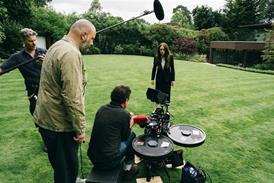Wendy Mitchell talks to Sarah McCarthy about her documentary which receives its North American premiere in Toronto.
Sarah McCarthy [pictured with the Diaz family], who was in Toronto in 2010 with The Sound of Mumbai, returns with The Dark Matter of Love, a documentary about a US family’s adoption of three Russian orphans interwoven with facts about the science behind love.
Since McCarthy shot the film, the subject has become even more topical due to Putin’s ban on Americans adopting Russian children.
The film has its North American premiere today; Preferred Content reps US rights while ro*co handles international.
How did you find the Diaz family for the film?
I wanted to make a film about the science of love. More specifically, how the love of your parents wires your brain in certain ways.
To do this, I first wrote to Robert Marvin (Pediatric Psychiatrist and director of the Mary D. Ainsworth Child-Parent Attachment Clinic in Charlottesville, Virginia) and said: ‘This is what I’m doing and this is what I’ve done before’ and ‘do you think that any of the families you are working with who are about to adopt might be up for being involved in something like this?’ The Diaz family were the first ones to write back.
They seem picture perfect for the film.
They were the only family to write, so we just got spectacularly lucky. For this reason and the fact that they worked at Disney for the last seventeen years, they were perfect.
Did it take any convincing for them to open up their home? It’s such an intimate portrait.
I pretty much lived with them for a long time and you just end up being friends because it’s your job to talk about their feelings with them. This is especially the case during times when it is so tense for all of them. You are specifically there to talk about exactly what they are going through.
You also have them explore all the different angles of what they are going through, meaning that you become very quickly bonded. I’ve been back to the their house four times since the filming. I stay in Masha and Cami’s room and it sort of feels like I’m the older sibling.
Were you worried you’d get no conflict to shoot?
I was more worried about not having the ‘happy ending’ that we were hoping for. There’s that. The film is condensed over about two years. When we first came back when they had the adopted kids, that whole shoot was just a disaster. The family fell apart and they stopped talking to each other. The kids were not connecting with anyone; it was just out of control. Masha was just completely closed down.
It was only when we came back for a couple of other shoots did we start to see real, amazing progress. We were just so delighted. When we first started filming, the cameraman and I both agreed that we’d absolutely never adopt children in a million years, but, by the end, we absolutely would have done.
The differences that you can see that you are making in these kids lives is extraordinary and there is something so special about taking in a little girl like that who doesn’t need anyone at all. She’s just this ferocious, tough, independent little being and then suddenly, slowly, she lets you in.
How did you find the archive footage of the studies of love and parenting?
Just through extensive searching. We had a professional archive researcher on board. I was doing all of the science research, so I was talking to Robert and all of his network. I was hunting down different experts in different fields to harass basically.
The Wellcome Trust put in a good chunk of the budget and they were really helpful and introduced me to lots of scientists. The archive researcher and my producer (Grace Hughes-Hallett) did a lot of trawling as well.
So how did you and Grace two hook up to make this film?
We met at Pulse Films (a production company established in 2005 by Thomas Benski & Marisa Clifford). We thought about taking Pulse on as a co-producer… The co-production wasn’t going to work with Pulse and Double Bounce so we went to Met Film instead and I managed to convince Grace to come with me.
I think that anybody can watch this film and take something from it. Does it feel that kind of big-picture film to you?
The most interesting conversations I end up having around the film are always along the lines of: ‘how did your relationship with your mother or father affect your marriage’ or ‘how did your relationship with your mother or father affect the way you think about yourself?’
Science has shown that evolution is hardwired in ways which dictate the way that we connect with each other. For example, the way in which I relate to my mother is completely dependent on how she related to her mother. The way I relate to my daughter and son will be heavily influenced by the way that I related to my mother.
I think the genius in this area of social science, is that it shows you what the healthy elements of a relationship are and where your relationship might be slightly askew. It gives you the tools and awareness to at least give yourself the chance to change some of these habits.
I feel that’s just core to who we are as human beings, it doesn’t matter if you are adopted or biological. It’s fascinating to see some of the insights which science has gained into the way our relationships hardwire our brain.
Why is Toronto a good home for this film?
I just love Toronto. Thom Powers was the guy who picked Sound of Mumbai off the slush pile… The platform that Toronto can offer a film like this is just insane. I absolutely love it and can’t wait to get back there. Thom Powers came through for us again.
Are you working on any new projects yet?
In terms of filmmaking, I’m working on an art installation piece for this book by a book designer called Irma Boom, and there will be an exhibition in Paris and Chicago.























No comments yet